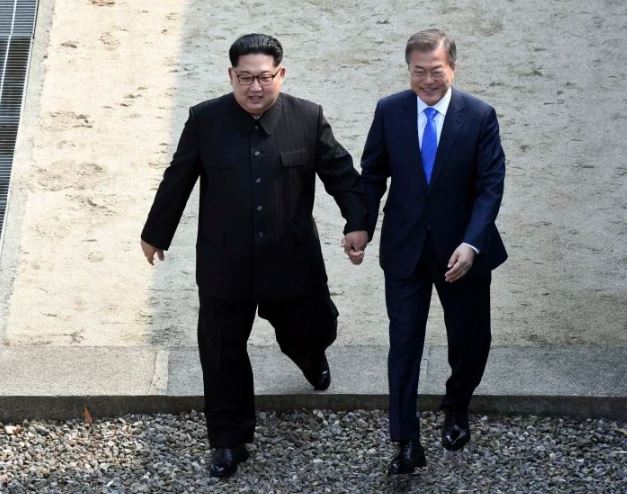North Korean leader Kim Jong Un made history by crossing over the world’s most heavily armed border to greet his rival, South Korean president Moon Jae-in. Mr Kim then invited Moon to cross briefly north with him before they returned to the southern side for talks on North Korea’s nuclear weapons.

Those small steps must be seen in the context of the last year – when the United States, its ally South Korea and the North seemed at times to be on the verge of nuclear war as the North unleashed a torrent of weapons tests. The moment must also be viewed in light of the long, destructive history of the rival Koreas, who fought one of the 20th century’s bloodiest conflicts and even today occupy a divided peninsula that is still technically in a state of war. ‘I feel like I’m firing a flare at the starting line in the moment of (the two Koreas) writing a new history in North-South relations, peace and prosperity,’ Mr Kim told Mr Moon as they sat at a table, its precise dimension of 2018 millimetres separating them, to begin their closed-door talks. North and South Korean leaders hold hands at the border

Mr Moon responded that there were high expectations that they produce an agreement that will be a ‘big gift to the entire Korean nation and every peace loving person in the world’. It was all smiles on Friday as Mr Moon grasped Mr Kim’s hand and led him along an blindingly red carpet into South Korean territory, where school children placed flowers around their necks and an honour guard stood at attention for inspection. Beyond the surface, however, it is still not clear whether the leaders can make any progress in closed-door talks on the nuclear issue, which has bedevilled US and South Korean officials for decades.
North Korea’s nuclear and missile tests last year likely put it on the threshold of becoming a legitimate nuclear power. North Korea claims it has already risen to that level. Mr Kim’s news agency said that the leader would ‘open-heartedly’ discuss with Mr Moon ‘all the issues arising in improving inter-Korean relations and achieving peace, prosperity and reunification of the Korean peninsula’ in a ‘historic’ summit.





















